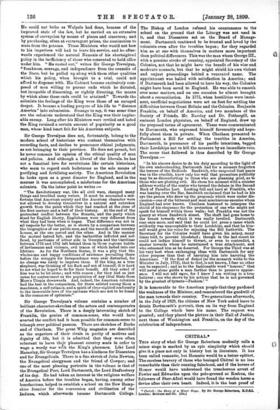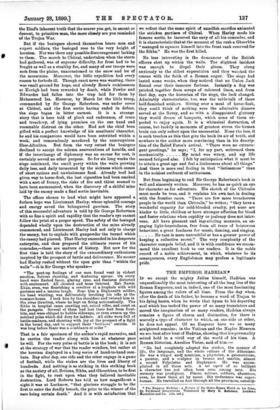CHITRAL.*
THIS story of what Sir George Robertson modestly calls a minor siege is marked by an epic simplicity which should give it a place not only in history but in literature. It has been called romantic, but Homeric would be a better epithet. The careless bravery of those who besieged Chitral is no less remarkable than their cunning falsehood, and if the heroes of Homer would have understood the treacherous arrest of Fowler and Edwardes upon the polo-ground at Reshun, the followers of Sher-Afzul would have found the wooden horse a device after their own heart. Indeed, it is the best proof of • Chitral: Ow Story of a Minor Biqa. By Sir George Robertson. MALL . London, Methuen and Co. VII.]
the Iliad's inherent truth that the nearer you get, in ascent or descent, to primitive man, the more closely are you reminded of the Trojan War.
But if the besiegers showed themselves brave men and expert soldiers, the besieged rose to the very height of heroism. Nor was there any possible discouragement lacking to them. The march to Chitral, undertaken when the storm had gathered, was of supreme difficulty, for frost had to be fought as well as a stealthy foe, and many of our troops were men from the plains, unaccustomed to the snow and ice of the mountains. Moreover, the little expedition had every
reason to forbode ill. Though exact news was wanting. there was small ground for hope, and already Ross's recklessness at Koraigh had been rewarded by death, while Fowler and Edwardes had fallen into the trap laid for them by
Muhammed Ise. However, by March 1st the little troop, commanded by Sir George Robertson, was under cover
at Chitral, and the first sortie having ended in defeat, the siege began in bitter earnest. It is a strange story that is here told of pluck and endurance, of truce
and treachery, of lying promises on the one hand and reasonable distrust on the other. Had not the chief been gifted with a perfect knowledge of his assailants' character, he and his companions would have been outwitted within a week, and remorselessly murdered by the unscrupulous Sher-Afzulites. But from the very outset the besiegers declined to accept the solemn asseverations of heralds, and if the interchange of diplomacy was an excuse for rest, it certainly served no other purpose. So for six long weeks the siege continued, the small party within the walls growing daily less, and daily tormented by the sickness which comes of short rations and unwholesome food. Already beef had given way to horse-flesh, the last cigarettes had been smoked with a sort of frenzy, the risks of fire and thirst seemed to have been surmounted, when the discovery of a skilful mine laid by the enemy made a final sortie inevitable.
The officer chosen to lead what might have appeared a forlorn hope was Lieutenant Harley, whose splendid courage and energy saved the beleaguered garrison. The story of this successful adventure is told by Sir George Robertson with so fine a spirit and rapidity that the reader's eye cannot follow the print at a proper speed. The safety of the besieged depended wholly upon the destruction of the mine already commenced, and Lieutenant Harley had not only to charge the enemy, but to explode with gunpowder the tunnel which the enemy had pierced. That Harley succeeded in his desperate enterprise, and thus prepared the ultimate rescue of his comrades,—these are matters of history. But now for the first time is told the story of the extraordinary enthusiasm inspired by the prospect of battle and deliverance. No sooner bad Harley rushed without the open gate thaa "within the walls "—it is Sir George who speaks-
" The pont-up feelings of our men found vent in violent emotion, furious shooting, and deafening uproar. On every hand were flushed faces, glaring eyes, and features distorted with excitement. All shouted and none listened. Rab Nawfiz Rhan, even, was flourishing a revolver at a loophole with wild gestures and a maniac laugh. Near him a Righunith soldier, his head whirling, was deliberately levelling his rifle at the summer-house. I took him by the shoulders and twisted him in the river direction, where he kept on firing automatically. The Sikhs in hospital came crawling out, seized rifles, and crept on the parapets. Several of them had lost their feet from frost- bite, and were obliged to hobble sideways, or even swarm up the notched poles which did duty for ladders. All alike were full of . battle-madness, and shouting with joy at the prospect of a fight in the broad day, and to support their 'brothers' outside. It was long before there was a semblance of order"
That is a fair specimen of the sailor's rapid narrative, and he carries the reader along with him at whatever pace he will. For the very pulse of battle is in the book; it is not at the strategy of war that the reader wonders, but rather at the heroism displayed in a long series of hand-to-hand com- bats. Day after day, one side and the other engage in a game of football, while the stakes are the lives and liberty of hundreds. And nothing is so striking in this striking book as the anxiety of all, Britons, Sikhs, and G-hoorkhas, to be first in the fight, to rush upon what they believed inevitable destruction. Lord Roberts has told us how magnificent a sight it was at Lucknow, "that glorious struggle to be the first to enter the deadly breach, the prize to the winner of the race being certain death." And it is with satisfaction that
we reflect that the same spirit of unselfish sacrifice animated the stricken garrison of ChitraL When Harley made his famous sortie, he incurred the envy of all his comrades, and it is characteristic that at the moment of the rash a Ghoorkha "managed to squeeze himself into the front rank reserved for the Sikhs." He was the first killed.
No less interesting is the demeanour of the British officers shut up within the walls. The elightest incident was enough to dispel their gloom. They clung anxiously to the oldest superstition and they watched the omens with the faith of a Roman auger. The siege had lasted some weeks, when they noticed that no Union Jack floated over their insecure fortress. Instantly a flag was patched together from scraps of coloured linen, and from that day, says the historian of the siege, the luck changed. Admirably characteristic, too, was the table-talk of these half-famished soldiers. Sitting over a meal of horse-flesh, they could think of nothing save the admirable dinners served at the Savoy, and so with a disappointed gluttony they would dream of banquets, which none of them ex- pected to enjoy again. It is a whimsical distraction, of course, but luckily in momenta of greatest stress the human brain can only reflect upon the unessential. None the less, it is such touches as this that give the book its air of truth, and nowhere is the author more convincing than in his descrip- tion of the Relief Force's arrival. "There were no extrava- gant greetings," he says ; "I, for my part, welcomed them
mechanically My mind was weary, and my life seemed fatigued also I felt by anticipation what it must be to attain a great age and feel a listlessness about all things." And there is more real feeling in that "listlessness" than in the noisiest outburst of enthusiasm.
But from beginning to end Sir George Robertson's book is well and sincerely written. Moreover, he has as quick an eye for character as for adventure. His sketch of the Chitralis must needs be true, and it explains his own tact in dealing with the frontier races. "There are few more treacherous people in the world than Chitralis," he writes ; "they have a wonderful capacity for cold-blooded cruelty, yet none are kinder to little, children or have stronger affection for blood and foster relations when cupidity or jealousy does not inter- vene. All have pleasant and ingi atiating manners, an en- gaging light-heartedneas, free from all trace of boisterous behaviour, a great fondness for music, dancing, and singing.
No race is more untruthful or has a greater power of keeping a collective secret." The very complexity of the character compels belief, and it is with confidence we recom- mend this excellent book to our readers. It is the noble record of a noble achievement, in which, whatever be its consequences, every Englishman may profess a legitimate pride.



















































 Previous page
Previous page